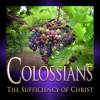
Sunday, November 13, 2011
by Robert Dean
Passage: Colossians 2:6-7
Series: Colossians (2011)
Duration: 53 mins 9 secs
The Greco Roman culture, not unlike our own culture, had no sense of sin. Yet we are again reminded by Paul, who uses the term 164 times, that we are "in Christ." But how do we receive Christ? How do we walk in Him? In this lesson, we learn that our walk experience is how we conduct our life, dependent upon God step by step and moment by moment.There are four keys in vs. 8 to walking in Christ. We are "rooted", we are "built up"; we are "established"; and we are "abounding". Understanding these concepts determines how your spiritual life grows and progresses.How well do you know doctrine? How is your own spiritual life growing?

Sunday, January 01, 2012
by Robert Dean
Passage: Colossians 2:12-14
Series: Colossians (2011)
Duration: 1 hr 8 mins 33 secs

Sunday, August 12, 2012
by Robert Dean
Passage: Colossians 3:16
Series: Colossians (2011)
Duration: 48 mins 15 secs
God commands corporate worship. It is valuable as an encouragement, a response to what God has done and a display of our joy. At the beginning of the 18th century Isaac Watts added a dimension to congregational singing. How was that change different than the changes brought about by contemporary church music today? Christians knew that all beauty existed in the mind of God and that to know beauty, we first had to know God. The Enlightenment shifted the idea of beauty to an internal, relative standard separate from the absolute standards of God. Beauty was in the eye of the beholder. Which idea reflects joy in worship which is all about God?

Sunday, September 09, 2012
by Robert Dean
Passage: Colossians 3:18 & Ephesians 5:22
Series: Colossians (2011)
Duration: 52 mins 14 secs
The foundation of a good marriage is orientation to authority, humility, submission and imitation of Christ and relationships within the Godhead. These are applications that extend to all relationships at every age and marital status. Preservation of this divine institution is essential for our culture to survive and for sanctification to live itself out in our lives. Marriage is defined in scripture, not by starry-eyed lovers or embittered divorcees. Marriage is to fulfill the purpose of God. The only way to know that purpose is to seek advice from scripture. Biblical roles for men and women create clarity. Our culture has attacked these roles creating gender confusion and cultural degeneration. Be encouraged about what the Bible teaches about marriage. Live out His truth in our confused culture and know abundance in a God-defined counter culture.This lesson also includes Genesis 1:26-28

Sunday, October 14, 2012
by Robert Dean
Passage: 1 Corinthians 13:4-7
Series: Colossians (2011)
Duration: 49 mins 20 secs
Where do you find a definition of love from which to set standards, expectations and goals? Does scripture clearly define love? Attributes of love are introduced throughout scripture in concepts including submission, authority, grace, mercy, faithfulness, forgiveness and a multitude of others. Love is ultimately exemplified at the cross. While emotion and affection can be a part of love, they are more the result than the motivator. God sets the standard for love, so to understand love we must know God. For a believer, love for one another is a reflection of God’s love for us which is based on His integrity and righteousness. The Holy Spirit is our only means of approaching the love God wants His body to exhibit toward one another and to perpetuate the stability of His divine institutions.
Note that the class series (Romans) on the video is incorrect.

Sunday, November 11, 2012
by Robert Dean
Passage: Colossians 3:18-21 & Ephesians 5:25-33
Series: Colossians (2011)
Duration: 46 mins 10 secs
The issue in these passages is for husbands to love their wives. The analogy is to love as Christ loves the Church. You must understand the gospel in order to understand this kind of love. The purpose for Christ’s love for His Church is to sanctify, purify and present her to Himself without residue of sin, eternally set apart to God. A Christian marriage is a training aid to show the world the relationship between Christ and His Church. Learn how elements of doctrine are revealed through marriage and its unique oneness lived out through different roles with distinct identities.

Sunday, December 09, 2012
by Robert Dean
Passage: Colossians 3:22-4:1
Series: Colossians (2011)
Duration: 47 mins 37 secs
Pastor Dean encourages us to listen to the excellent presentations from the recent Pre-Trib Conference where the core doctrine presented is the rejection of the sufficiency of Scripture.In his address to masters and slaves, Paul is not making a statement about social change. Neither is he endorsing or rejecting slavery. Change is brought about by the application of Christian principles, and the universal principle here is; whatever you do, do it heartily as unto the Lord and not to men. Paul uses reward and repayment as legitimate motivation, not necessarily reward in time, but the reward of inheritance. Orientation to authority, accountability, obedience and humility of master and servant is a function of shedding the self absorption of the flesh and focusing on the pattern of service of Jesus Christ, the ultimate authority, in the same manner He subjected Himself to the authority of the Father when, as a man on this earth, he suffered injustice beyond any we will ever encounter.

Sunday, January 13, 2013
by Robert Dean
Passage: Proverbs 1:8-9
Series: Proverbs (2013)
Duration: 49 mins
Proverbs recognizes the family as the first environment for learning. Proverbs exhorts children to listen attentively and learn. Knowing is to comprehend facts. Wisdom is that knowledge applied. Wisdom begins with recognition of God’s authority. The facts that are applied as wisdom are taken from the manual God has provided in His Word. Any other source of wisdom taught in the home is a path to destruction. The chain of command over the child resides in both parents, beginning with the priority role of the father. Learn about the metaphors and their ties to antiquity, which describe the rewards for the child who obeys these commands. Wisdom is application of God’s absolute Truth. Wisdom is the parents’ legacy to their children which will defend, guard, protect and become their basis for rewards.

Sunday, February 10, 2013
by Robert Dean
Passage: Proverbs 2
Series: Proverbs (2013)
Duration: 47 mins 51 secs
Choices may fall into the category of wise and not so wise. The only way to discern this fine line requires a great deal of preparation through immersing oneself in the Word of God over time, because human viewpoint has a way of seeping through the most minute weak spot in our armor. Priority and passion for God’s instruction is a choice. It is the required foundation of the path to wisdom. Understand the essence of meaning behind the phrases, “Receive my words” and “Hide my commandments.” See how these concepts are themes which run throughout scripture. Understand the profound importance of memorizing scripture and the protection, strength and recovery exclusive to its availability in our minds.
Click on the notes link below to access the Scripture Memory Plan Dr. Dean mentioned during this class.

Sunday, April 14, 2013
by Robert Dean
Passage: Proverbs 4:1-9
Series: Proverbs (2013)
Duration: 44 mins 58 secs
Does it take a village to raise a child? This misguided notion insists that training children must be a joint effort of schools, families, and government organizations. Proverbs 4 places the teaching of good judgment and clear thinking solely on the shoulders of parents. Listen to this lesson to learn the role of the father in the generational transfer of wisdom and how fathers should develop a plan to instruct their children from infancy to adulthood. Learn what wrong thinking lies beneath the beliefs of Plato, Rousseau, and others who hold that children belong to the community. See how wisdom is not always a matter of right or wrong and common sense is not so common.
 Interlocked
Interlocked Angelic Conflict
Angelic Conflict Angelic Rebellion (2020)
Angelic Rebellion (2020) Apologetics
Apologetics Basics: Intro to Christianity
Basics: Intro to Christianity Biblical Framework for Economics
Biblical Framework for Economics Birth of Christ
Birth of Christ Christianity and the American Republic
Christianity and the American Republic Church Leadership
Church Leadership Creation Special 2010
Creation Special 2010 Creation Studies
Creation Studies Divine Guidance
Divine Guidance Faith-Rest Drill: Learning to Trust God
Faith-Rest Drill: Learning to Trust God Has God Spoken? (2021)
Has God Spoken? (2021) Inspiration & Inerrancy
Inspiration & Inerrancy Interlocked (2023)
Interlocked (2023) Marriage & Family
Marriage & Family Messiah
Messiah The Ministries of God the Holy Spirit Today
The Ministries of God the Holy Spirit Today Olivet Discourse
Olivet Discourse Redemption & Forgiveness
Redemption & Forgiveness Sermon on the Mount
Sermon on the Mount Spiritual Life: How Does a Christian Grow
Spiritual Life: How Does a Christian Grow Tabernacle Study
Tabernacle Study Understanding Judgment, Rewards, & Inheritance
Understanding Judgment, Rewards, & Inheritance Worship & Music
Worship & Music Worship, Biblical
Worship, Biblical